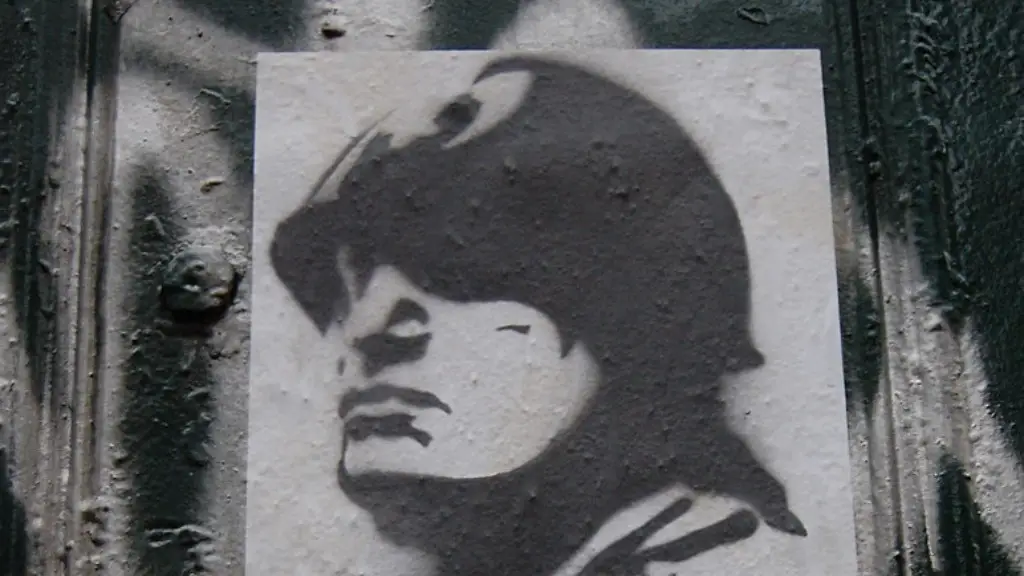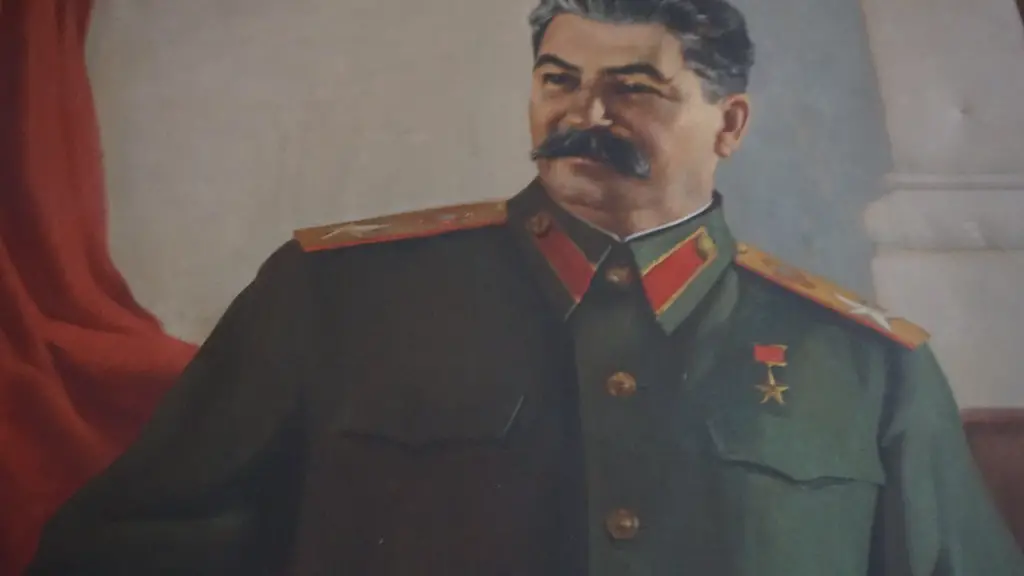In order to understand whether Benito Mussolini was a socialist, it is necessary to understand the definition of socialism. Socialism is an economic and political system in which the means of production are owned by the community as a whole and production is used to benefit the community, rather than private individuals. With this definition in mind, it is clear that Mussolini was not a socialist.
No, Benito Mussolini was not a socialist. He was the founder of the National Fascist Party in Italy and led the country as its Prime Minister from 1922 to 1943. Fascism is a right-wing, authoritarian ideology that is opposed to socialism.
In 1912, Mussolini became a member of the National Directorate of the Italian Socialist Party (PSI), but he was expelled from the PSI for advocating military intervention in World War I, in opposition to the party’s stance on neutrality.
Italian fascism was a political movement that emerged in the early 1900s. The movement opposed liberalism, especially classical liberalism, which fascist leaders denounced as “the debacle of individualism.” Fascism was opposed to socialism because of the latter’s frequent opposition to nationalism, but it was also opposed to the reactionary conservatism developed by Joseph de Maistre.
What type of government did Mussolini believe in
In Italy, Benito Mussolini used his charisma to establish a powerful fascist state. The word “fascism” comes from the Latin word “fasces” which means a bundle of sticks tied together. This is a symbol of strength and power. Mussolini’s fascist state was based on the principles of national unity, violence, and totalitarianism. Under Mussolini’s rule, the Italian government became increasingly autocratic and repressive. Political opponents were silenced and the media was tightly controlled. The economy was centrally planned and the state played a key role in industry. Mussolini’s fascist regime ultimately led to Italy’s involvement in World War II.
Fascism is a political ideology that rose to prominence in the early 20th century. Fascism opposed class conflict and the egalitarian and international character of socialism. It strongly opposed liberalism, communism, anarchism, and democratic socialism.
Italian socialism was divided into two major parties after World War II: the Partito Socialista Italiano (PSI), led by Pietro Nenni, and the Democratico Italiano, led by Giuseppe Saragat. Both parties faced a number of challenges in promoting democratic socialism, especially the lack of a strong and independent socialist movement.
Fascism is an economic system that incorporates elements of both capitalism and socialism. Fascist economists believe in self-sufficiency and individual profit, but also believe that the government should provide subsidies to corporations. This system was first developed in Italy during the early 1920s.
Fascism is a political ideology that advocates for a dictatorship, while socialism is an ideology that calls for individuals to own the means of production. A fascist leader would have complete control over a country, while rulers in socialist nations would distribute power among the states.
The dichotomy between fascist support for private property rights and large-scale capitalism versus their desire to eliminate autonomy and relegate it to the state is a difficult one to reconcile. On one hand, fascism clearly supports the existence of a market economy and very wealthy individuals. On the other hand, fascist ideology also includes anti-capitalist elements that would seek to reduce the autonomy of large-scale capitalism. It is unclear how these two positions can be reconciled.
What is fascism vs communism
Whereas communism is based on the holding of property in common, with the goal of economic equality, fascism is based on the principle of private ownership of property and a hierarchical society with strict class roles. The government in a fascist society is controlled by a single dictator who has absolute power.
Mussolini’s Fascist Party was a right-wing organization that advocated Italian nationalism. They had black shirts for uniforms and launched a program of terrorism and intimidation against their leftist opponents.
The main difference between communism and socialism is that under communism, most property and economic resources are owned and controlled by the state, while under socialism, all citizens share equally in economic resources as allocated by a democratically-elected government.
Fascism is an authoritarian political ideology that seeks to create a single, unified national community by exalting the nation above the individual. It emphasises the need for a strong central government to lead the country and promote national unity, and it also emphasises the importance of law and order to maintain social stability. Fascism usually includes a strong element of ultranationalism, and it often includes aggressive rhetoric and actions towards perceived enemies of the nation.
What religion is fascism
In the 1929 Lateran Treaty, Mussolini recognized the Pope as sovereign ruler of the Vatican City state. This made Roman Catholicism the state religion of Fascist Italy.
The Marxist-Leninist states are those countries that have a Communist party in power and follow the ideology of Marxism-Leninism. This includes the People’s Republic of China, the Republic of Cuba, the Lao People’s Democratic Republic, and the Socialist Republic of Vietnam.
When did Italy stop being communist?
The Italian Communist Party (Partito Comunista Italiano, or PCI) was a political party in Italy from 1921 to 1991. It was founded in 1921 as a split from the Italian Socialist Party (PSI), and was led by Antonio Gramsci until his death in 1937. The PCI played a leading role in the resistance to Fascism in Italy and helped to bring about the postwar Italian Republic.
There are several reasons why no country has ever experimented with pure socialism. First, socialism is a very complex economic system that is difficult to implement in practice. Second, socialism requires a high degree of coordination and cooperation between economic actors, which is often difficult to achieve. Third, socialism often leads to inefficiencies and lower economic growth, as was the case with the Soviet Union. Finally, socialism is often associated with authoritarianism and limited political freedoms, which are not desirable for most people.
Capitalism is an economic system in which property and businesses are owned and controlled by individuals. The production and prices of goods and services are determined by how much demand they generate and how difficult they are to produce.
Capitalism can be a very efficient way to produce and distribute goods and services. It encourages competition, which can lead to innovation and lower prices. It also allows people to become very wealthy, which can create social inequality.
Is Denmark socialist or capitalist?
Denmark is far from a socialist planned economy. Denmark is a market economy”. Since 1993, the Ministry of Business and Growth (Danish: Erhvervs- og Vækstministeriet) is responsible for the main economic policy areas of the Danish government.
What are the advantages of socialism over capitalism?
In theory, based on public benefits, socialism has the greatest goal of common wealth; Since the government controls almost all of society’s functions, it can make better use of resources, lands, minerals, and most importantly, the people. In theory, socialism is the best form of government for the poor.
What’s the difference between socialism and capitalism quizlet?
What is the difference between socialism and capitalism? Socialism focuses on equality for all members of society, and capitalism emphasizes competition and individualism.
What does socialism for the rich mean?
From Wikipedia, the free encyclopedia. Socialism for the rich and capitalism for the poor is a classical political-economic argument which states that there is a diversified economic system in capitalist societies.
What are two benefits of socialism?
In theory, based
Warp Up
No, Benito Mussolini was not a socialist. He was the founder of the fascist party in Italy and an ally of Nazi Germany during World War II.
Mussolini was a complex man with a complex political ideology. While he did call himself a socialist, many of his ideas and policies were in stark contrast to the traditional socialist values. In the end, it is hard to say definitively whether or not Mussolini was a true socialist.





